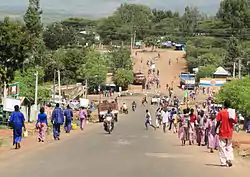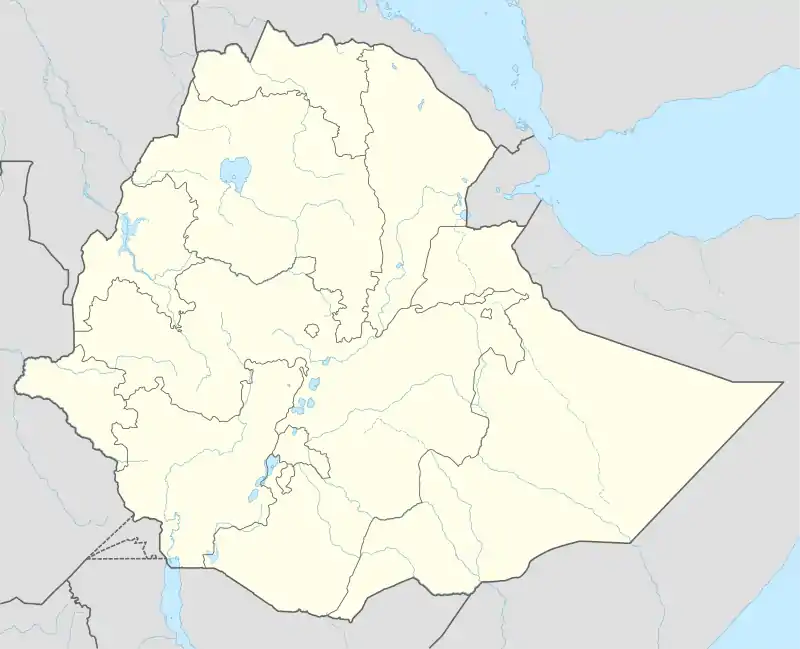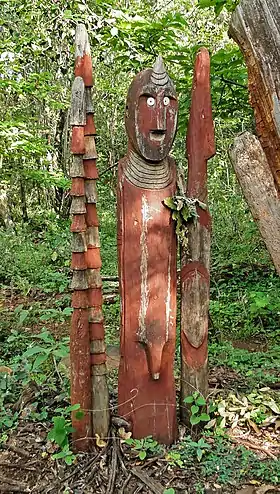Konso
Konso (also known as Karati) is a town on the Sagan River in south-western Ethiopia. The administrative center of the Konso special woreda of the Southern Nations, Nationalities, and Peoples Region, this town has a latitude and longitude of 5°15′N 37°29′E and an elevation of 1650 meters. It is also called Pakawle by some of the neighboring inhabitants.[1]
Konso
Karati, Pakawle | |
|---|---|
 Town of Konso | |
 Konso Location within Ethiopia | |
| Coordinates: 5°15′N 37°29′E | |
| Country | Ethiopia |
| Region | Southern Nations, Nationalities, and Peoples |
| Special woreda | Konso |
| Elevation | 1,650 m (5,410 ft) |
| Population (2005) | |
| • Total | 4,593 |
| Time zone | UTC+3 (EAT) |
| • Summer (DST) | UTC+3 |
| Official name | Konso Cultural Landscape |
| Criteria | Cultural: (iii), (v) |
| Reference | 1333rev |
| Inscription | 2011 (35th session) |
| Area | 23,000 ha (57,000 acres) |
History

In 1897, Menelik II took over the city.[2]
Konso and its culture were gradually uncovered by Europeans during the XXth century. Father Azaïs presented the Waga (wa'kka) statues in 1931. In 1956, Murdock associated the archeological megaliths of the town to a cushitic signature. In Kluckhohn's Markets of Africa published in 1962, the author traces high levels of ancient economic developments in the city. In 1984, Amborn studied the historic labor-intensive agricultural techniques of the region.[2]
The site was added to the UNESCO World Heritage Tentative List on September 30, 1997 due to its purported universal cultural significance and official made a World Heritage Site in 2011.[3] Konso is the first place in Ethiopia recognized as a "cultural landscape".[4]
A permaculture farm, Strawberry Fields Eco-Lodge, was founded in 2007 north of town and works with international volunteers and three local schools to grow food, promote ecotourism, and provide permaculture education.[5]
Description
Konso, named after the Konso people, is known for its religious traditions, waga sculptures, and nearby fossil beds (the latter an archaeological site of early hominids).
Economy
Philip Briggs suggests that the present-day town "might prosaically be described as a traffic circle of comically vast dimensions, surrounded by a solitary petrol station and a scattering of local hotels."[6] According to the SNNPR's Bureau of Finance and Economic Development, as of 2003 Konso's amenities include digital telephone access, postal service, electricity provided by a generator, and a branch of a microfinance organization.[7] Local industries include beekeeping, cotton weaving, and agriculture. The market is held on Mondays and Thursdays at a point 2 kilometers from town along the Jinka Road.[8]
Demographics
Based on figures from the Central Statistical Agency in 2005, Konso has an estimated total population of 4,593 of whom 2,258 are men and 2,335 are women.[9] The 1994 national census reported this town had a total population of 2,535 of whom 1,250 were men and 1,285 were women.
Notes
- Klaus Wedekind, "Sociolinguistic Survey Report of the Languages of the Gawwada (Dullay), Diraasha (Gidole), Muusiye (Bussa) Areas", SIL Electronic Survey Reports, 2002-065, p. 16.
- Shako Otto, Traditional Konso culture and the missionary impact, Persee.fr, 2005
- Konso-Gardula (paleo-anthropological site) - UNESCO World Heritage Centre
- Ethiopia: Konso People Celebrate UNESCO World Heritage Support, Christensenfund.org, 1 August 2012
- "Strawberry Fields Eco-Lodge - An Adventure of a Stay" Archived 2010-09-15 at the Wayback Machine, Make Travel Fair UK website (accessed 15 January 2011)
- Philip Briggs, Ethiopia: The Bradt Travel Guide, 3rd edition (Chalfont St Peters: Bradt, 2002), pp. 455f
- "Detailed statistics on hotels and tourism" Archived May 31, 2011, at the Wayback Machine, Bureau of Finance and Economic Development website (accessed 4 September 2009)
- Briggs, Ethiopia, p. 456.
- CSA 2005 National Statistics Archived July 31, 2008, at the Wayback Machine, Table B.4
Further reading
- Watson, Elizabeth E. (2009). Living terraces in Ethiopia: Konso landscape, culture & development. Eastern Africa series. Woodbridge, UK ; Rochester, NY: James Currey. ISBN 9781847010056.
